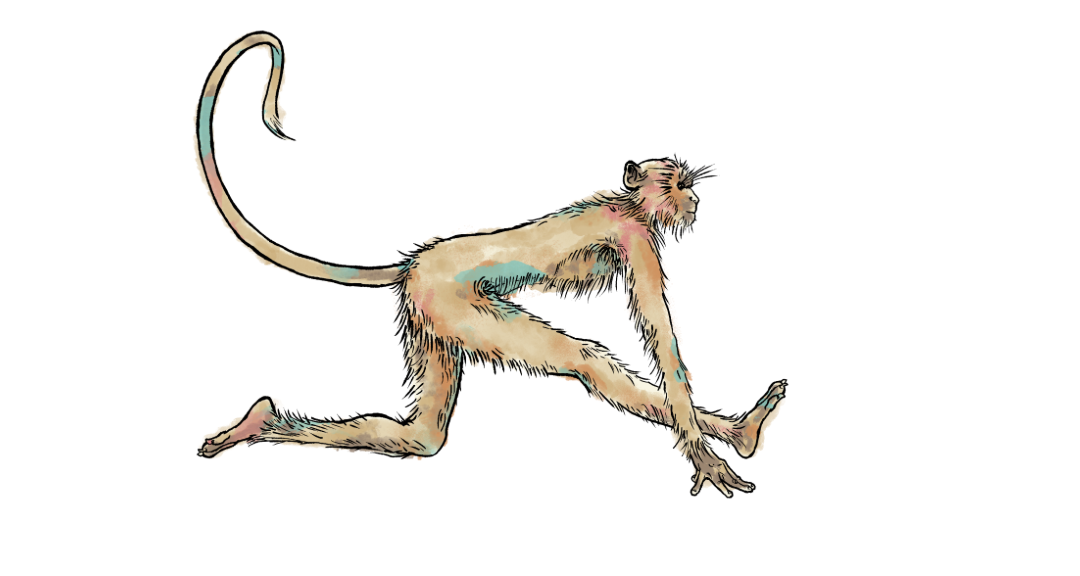We cannot contemplate animals for long before we are forced to grapple with the concept of anthropomorphism, the attribution of human characteristics to beyond-human beings. It used to be a grave sin, especially in the sciences, to anthropomorphize. For example, I was once tasked with developing an ethogram, a catalog of behaviors, for a captive group of ring-tailed lemurs. Every inkling of my humanness detectable in the document was flagged the way an English teacher circles misspelled words in red ink. A lemur kiss could only credibly be described as “lip-to-lip-contact,” and I should not dare to assume that the intention of the lemur kisser has anything to do with love or affection. I understand and value that lesson as it pertains to the study of animal behavior, but now I proudly anthropomorphize. I believe it is inevitable. I also believe that the only people who have a real problem with anthropomorphism are those who are still attached to the dichotomy between humans and beyond-human beings. Do cats felipomorphize dogs? Probably, but I don’t see scientists all in a tizzy about it!
The problem with anthropomorphism is that it enforces the boundary between us and other. Yes, anthropomorphism can be used superficially or to inappropriate ends. We must engage in it with a reflective mind, anthropomorphizing from a point of connection and curiosity instead of using it as a barrier that limits our understanding of our fellow animals. But we have no choice. The ways in which we perceive the world are human. Human animal. The fear of anthropomorphism and the distance it creates between individuals are far more harmful than the animal-to-animal connections inspired and initiated by it. Relating to other animals and seeking connections between our experience of the world and theirs is natural and often mutually beneficial, not to mention beautiful.
Some scientists have argued that it is a pointless waste of time to attempt to consider the world through the perspectives of other animals. Not surprisingly, I disagree. We must at least attempt this noble feat, if we are to avoid anthropodenial, a term coined by esteemed primatologist Frans de Waal. Anthropodenial occurs when humans deny that beyond-human beings might share certain characteristics with us, or vice versa, when we deny that we are animals. And while we may never know what it is like to be a terrestrial snail snacking on mycelium, it is a mistake not to try to imagine the myriad earthy flavors as we chomp with thousands of mollusk choppers. To avoid anthropodenial, according to scholars such as Jane Bennett and Radhika Govindrajan, we need imagination, creativity, play, and attention to the senses. Human children, much like beaver kits, bear cubs, and gecko hatchlings, excel at this more easily than adults. This is where yoga comes in.
The word yoga comes from the Sanskrit for “to yoke, to unify, unite, connect.” There are eight limbs of yoga including asana, pranayama (breath regulation), pratyahara (withdrawal of the senses), dharana (concentration), dhyana (meditation), yamas (social ethics), niyamas (personal ethics), and samadhi (integrated union). Yoga is so much more than asana. Practice the poses, sure, but to understand yoga more deeply, I recommend exploring all eight limbs for yourself. Breathe with intention. Live an ethical life. Engage with and give back to your community. Read the yoga philosophy classics such as the Bhagavad Gita and Autobiography of a Yogi, study with experienced teachers, and decide what yoga practices resonate for you the most. Be who you are and feel what Stephen Cope calls the “warm animal of your body.”
I am not a yoga expert. I teach yoga, but I am a student first and foremost, always learning more. I am grateful to my teachers and my teachers’ teachers’ teachers all the way back to the origins of this tradition in South Asia. I know what yoga is to me, and I know that my yoga is different from that of the person next to me. This is the core message of this book. We are different, but we can share experiences with other beings that teach us, transform us, and convince us otherwise. Our forms may be different, but we are also all the same. All one, divine being. That is yoga. The union that occurs when we partner the movements of our body with our breath in our asana practice is an example, writ small, of what yoga means to me: union of our individual selves with the universal, divine Self.
From Wild Asana by Alison Zak, published by North Atlantic Books, copyright © 2023 by Alison Zak. Reprinted by permission of North Atlantic Books.
Wild Asana comes out June 27th. You can preorder your copy here: https://www.northatlanticbooks.com/shop/wild-asana/
Learn more about the author here: https://alisonzak.com/
Check out some of Alison Zak’s other works for OneNature!
